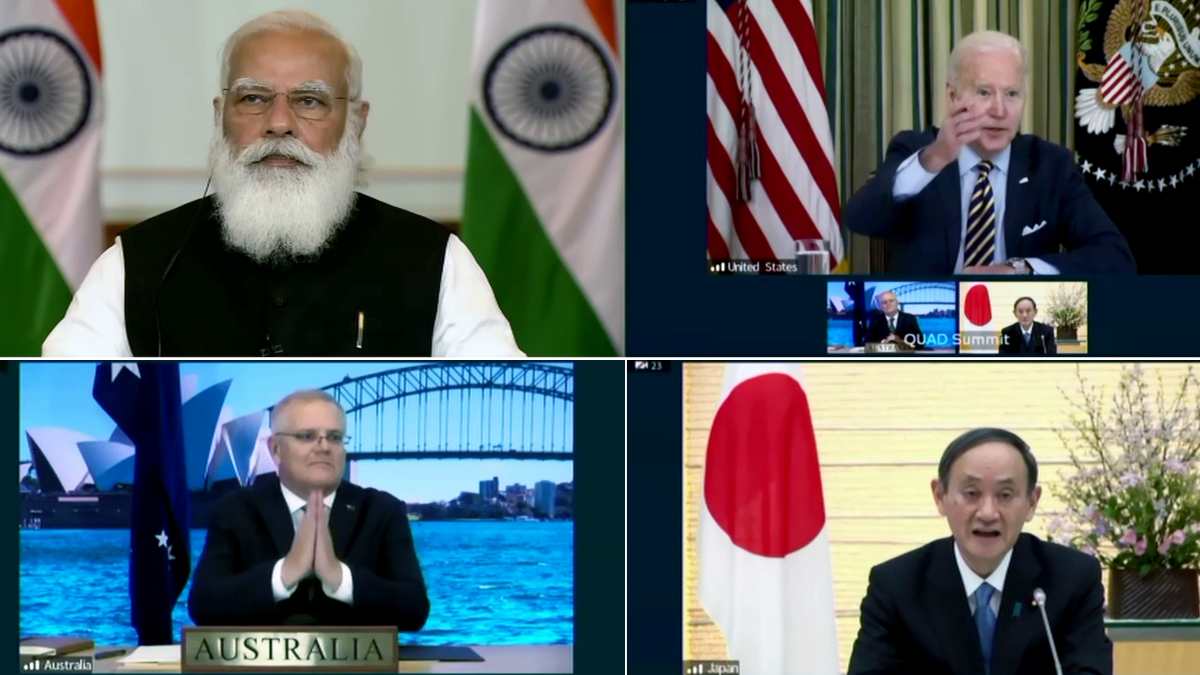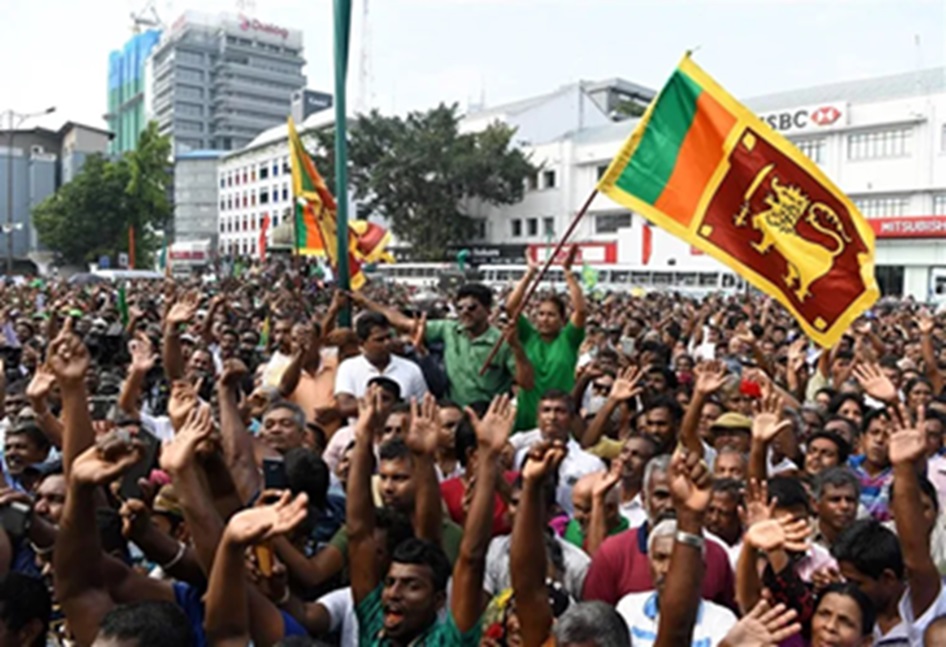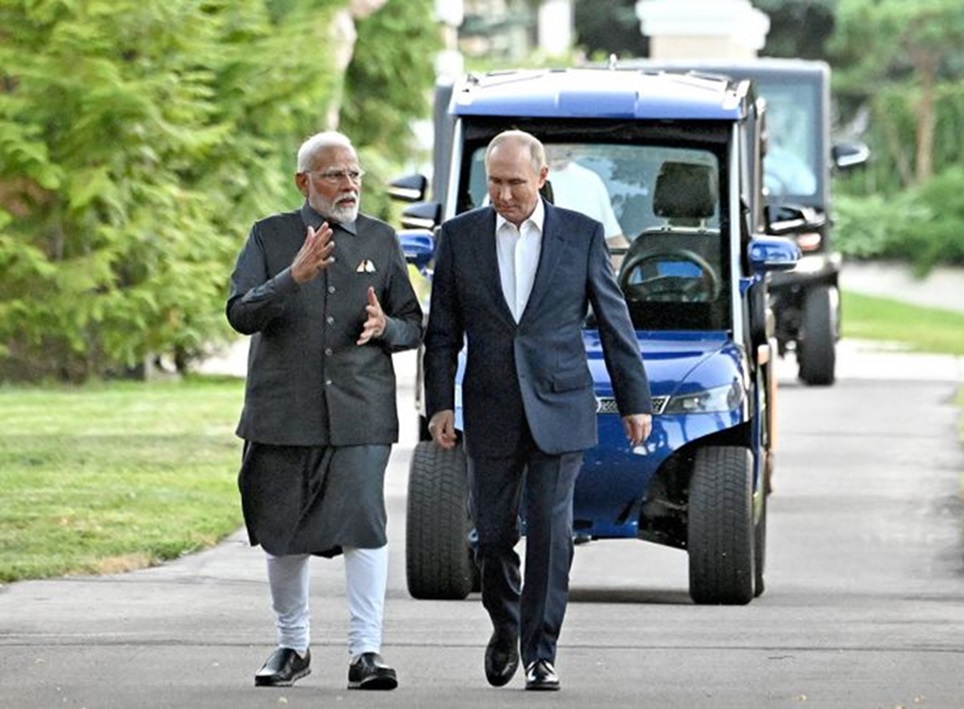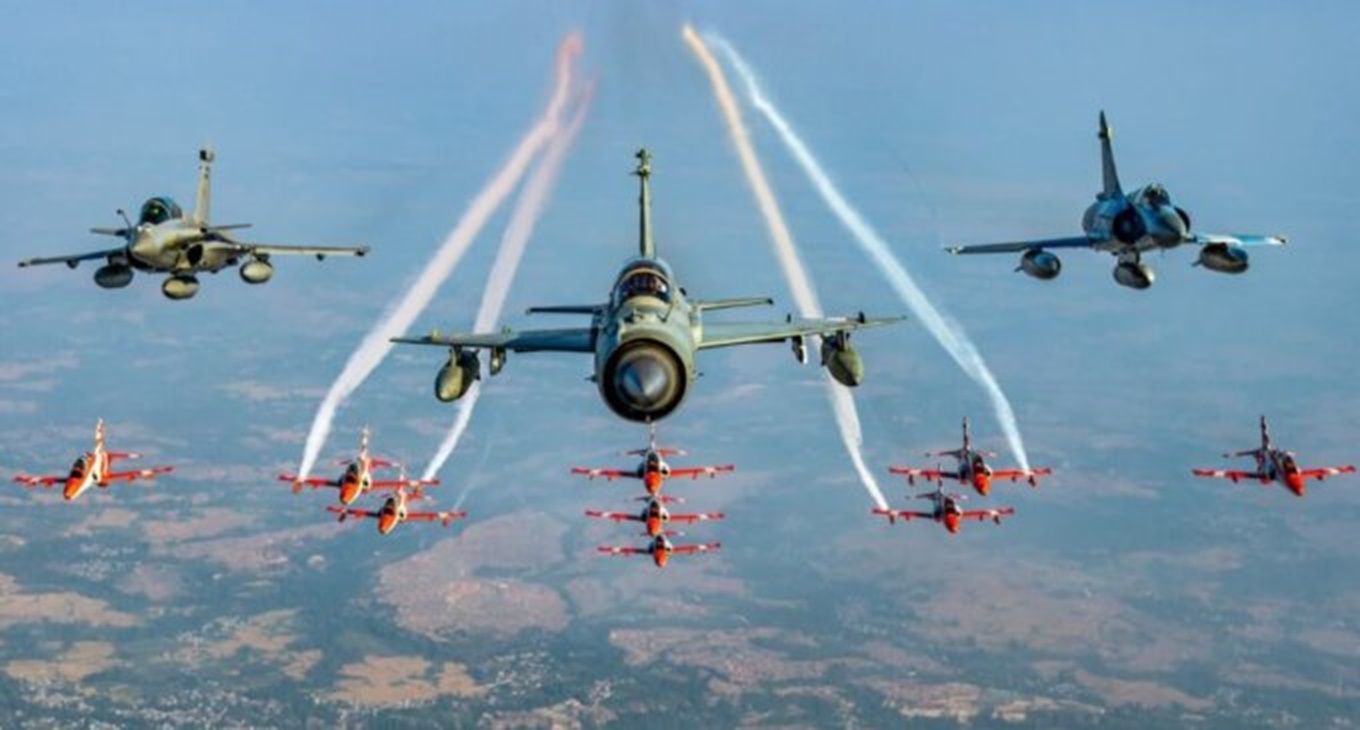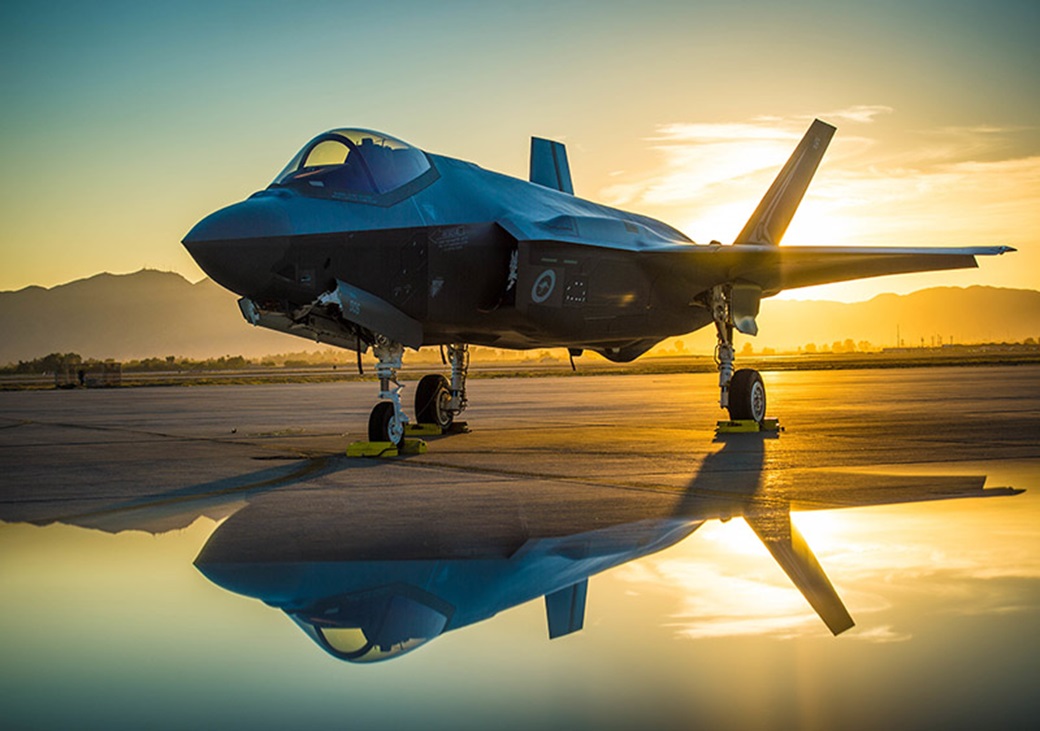QUAD got rejuvenated last year after the advent of COVID 19.
Four nations Quadrilateral Security Dialogue shortly called Quad has seen many up and down between its inception post-2004 Tsunami, which caused massive loss of lives and destruction to infrastructures in South and South-East Asia, and on the wake up which the then US President announced that India, the U.S., Japan and Australia would set up an international coalition to coordinate the massive effort required to rescue those trapped in the waters, rush relief, and rehabilitate those made homeless, and to restore power, connectivity lines as well as infrastructures like ports and roads, and its (Quad) first Summit level meeting amidst rampaging run of Covid19 -though virtual due to pandemic- held on 12 March 2021. The Summit meeting is the most significant as the event held within two months of President Mr Joe Biden, one of the most experienced US foreign policy czar, several terms Senator and two terms Vice President of the country, has taken the oath of office. The event followed two ministerial-level meetings among member countries’ foreign ministers physical and virtual in quick successions in the last quarter of 2020 and the first quarter of 2021 respectively. In the wake up the Summit meeting, this author along with others has concluded that ‘Finally, Quad, if not the Asian-NATO, has come of age.
“We are united by our democratic values and our commitment to a free, open and inclusive Indo-Pacific. Our agenda, covering areas like vaccines, climate change, and emerging technologies make the Quad a force for global good. We will work together, closer than ever before on advancing our shared values and promoting a secure, stable and prosperous Indo-Pacific,” said PM Narendra Modi in the Summit meeting, and latter expressing satisfaction, he furthered, “The Quadrilateral Framework will be an important pillar of stability in the region.” Thus, he sounded very optimistic and enthusiastic about the future of grouping when the People’s Liberation Army, the world second best military power in the conventional sense, has been sitting on the country’s Himalayan border with full battle-gears in one hand and pandemic has been rampaging the country’s economy and public health wave after wave on the other.
Australian PM Scott Morrison while laying out the agenda of the quad, said, “We join together as leaders of nations to welcome what I think will be a new dawn in the Indo-Pacific through our gathering.” While Japanese PM Yoshihide Suga, whose predecessor Mr Shinzo Abe who was prime-mover of the Quad during his early tenure in the second half of the 2000s as PM, acknowledged the Quad’s new dynamism due to the meeting of the top leaders of the member countries for the first time, said, “With the four countries working together, I wish to firmly advance our cooperation to realize a free and open Indo-Pacific, and to make a tangible contribution to the peace, stability, and prosperity of the region, including overcoming Covid19.”
“And we’re renewing our commitment to ensure that our region is governed by international law, committed to upholding universal values and free from coercion. We’ve got a big agenda ahead of us,” said US President Joe Biden, who was the prime-mover of fast-tracking the first Summit meeting.
The Summit’s joint statement under the title ‘The Spirit of the Quad’, read, “We will join forces to expand safe, affordable, and effective vaccine production and equitable access to speed economic recovery and benefit global health.” This means the major deliverable at the Summit was the vaccine initiative under which vaccines against Covid19 would be developed in the US, manufactured in India, financed by Japan and the US, and supported by Australia.
But, many Quad observers including this author do not agree fully as they believe that the Quad is primarily a grouping of democratic countries to contain Communist China during post-Tsunami in 2004 and now during recent Chinese belligerence amidst the run of dreaded pandemic -allegedly developed in China- in the region threatening regional peace. This was for what former Australian PM Chinese speaking Kevin Rudd while withdrawing from Quad in 2008 said ‘Oceania can’t afford another Cold War’. Even Australia stopped participating in the Malabar Naval Exercise of four Quad countries from 2008, which she had joined a year back. And as per Daniel Twining, the Director of Washington DC-based Asia Program at the German Marshall Fund of the United States ‘the arrangement could lead to military conflict’ or could instead ‘lay an enduring foundation for peace’ assuming that ‘China becomes a democratic leader in Asia’. In the meanwhile, instead of China becoming ‘assumed’ democratic leader in Asia, has been the most authoritarian and looks like leading such regimes all over the world including in the South and South-East Asian region.
Apart from the above, Russian leadership are dead against Quad, whether it is due to not being invited for membership of Quad despite having strategic geographical presence in the region at its eastern corridor or due to her military ally and one of the major military power in the region that is India has been made core member of Quad, and have already expressed concern making it clear that ‘the Quad is China-centric’. And in the meantime, Russia was found cosying with China though they have unsettled border in Russia’s eastern region and fought a bloody war in 1969, and both are struggling diplomatically for influence in resource-rich Central Asia countries, which were once part of the USSR, the legacy Russia wants to retain, and where now China has massive investments under its BRI scheme. Here, all concerned should note that China has already occupied 1000 Sq KM of land in Tajikistan as the latter could not repay the former’s loan which is 35.9% of the country’s GDP.
The basic threads that have pulled Quad members together are their commitment to democratic values and to a free, open and inclusive Indo-Pacific. They are in the language of Shinzo Abe the ‘arc of democracy’ in the Eurasia region. But, all the hope of ‘Finally, Quad, if not Asian-NATO, has come up age’ has been dashed when Indian PM announced to hold 2+2 ministerial meeting between foreign and defence ministers of India and Russia –the kind India has with only Quad member countries- after a telephonic talk with Russian President Mr Vladimir Putin in the last week of April 2021 when he was fully occupied in macro-managing the second wave of pandemic and crucial state assembly election campaign amidst unsavoury attacks of Indian media and civil society on him accusing him of murders of Covid patients as if he is solely responsible for the national health crisis. As per the Indian Constitution, public health is a state subject.
Post-first Quad Summit meeting, have the four incidents that took place in quick succession post-Biden took the oath of office forced PM Modi to go for second thought while distancing from Russia in favour of Quad which is virtually led by the super-power US? Are they (1) downgrading of India’s ranking in US government-funded influential Freedom House Report-2021, (2) the US Navy’s 7th April press release that says its 7th Fleet’s warships and guided-missile destroyer USS John Paul Jones had asserted navigational rights and freedoms around 130 nautical miles west of Lakshadweep that India considers its Exclusive Economic Zone (EEZ), (3) blocking raw materials for Covid pandemic vaccines, and last but not the least is (4) the US media houses –overtly close to Biden Administration and Democratic Party- onslaughts on Indian government pandemic management. The possibility cannot be ruled out.
Freedom House downgraded India allegedly among others on an issue related to the political right to Muslims despite their representation –mentioned in Freedom House report 2021– increased from 22 in GE2014 to 27 in GE2019 in the lower house in Indian Parliament, on an issue related to CAA which grants special access to Indian citizenships to persecuted minorities -following India’s age-old cultural ethos of providing shelter to persecuted religious communities- from neighbouring countries where forceful religious conversion, rape and murder of minorities have been routine since the unfortunate partition of India in 1947 and since then minorities population has been drastically falling whereas India witnessed an increase in minority population, and scrapping of provision for appointing two Indian Europeans ignoring that it was a temporary provision in Indian Constitution and in the meanwhile the community has stayed in India for seven decades. Freedom House also downgraded India’s ranking on Free Press despite the known facts that earlier Indian media houses had paid KGB agents and now they are crowded with alleged Abrahamic evangelist-cum insider-trading convict George Soros paid agents, however, the government of India has closed its eyes on the issue among other related media issues.
Coming to the US Navy assertion on navigational rights and freedoms around 130 nautical miles west of Lakshadweep that India considers its Exclusive Economic Zone (EEZ), here it is necessary to mention that the US herself is not a signatory of the United Nation Convention on the Laws of the Seas (UNCLOS) that governs ocean affairs all over the world and whereas India is a signatory, and as per the laws, India’s EEZ is legally protected from external navigational encroachment. However, it is not a big issue and could have been buried in any military file as had been in the past as claimed now. But, it became a big issue when the US Navy asserted her navigational rights and freedoms through a press release and remains adamant despite India’s protest.
In the Quad Summit Meeting, it was decided that India would be a manufacturer of Covid vaccines for Indo-Pacific distribution, but the US blocked the export of raw materials to India invoking wartime laws. Is it not hypocrisy? It does not mean India does not have enough raw materials to meet vaccines production needed to take care of its citizens. But, in the meanwhile, India distributed and exported 60 million doses to countries which either don’t have the capacity or resources to develop and produce them for their citizens. Is it a crime to help the poor when rich and developed countries blocked vaccines 9/7/3 times of their population requirement? Is this behaviour deserving of super-power stature?
Lately, the leading US media houses, known very close to Democratic Party and Biden Administration as seen during the presidential election campaigns in 2016 and 2020, are found very aggressive in disseminating abusive news, views and visuals on India’s pandemic management exclusively defaming its present ruling party in centre despite it is known fact that pandemic has caused much more damage to the health of US citizens and country’s economy compared to India. This is nothing less than a typical Western motivated campaign against the East with narrow ethnic, cultural and religious stinks of the colonial era.
In view of the above, to assume that the US could remain a dependable ally of India –particularly so long as Biden-Harris combined is in the US’s helms of the affairs- during the crisis is foolhardy. So, why should lose Russia which has been a dependably military ally and arms suppliers for long six decades, and with which there are many sophisticated arms production collaborations including Supersonic Brahmos and MIG fighter jets, the mainstay of the Indian Military? And PM Modi, when he is attacked from all sides for whatever he does, he cannot take risk which means Quad upswing would not get sustained gear.
Disclaimer: The views and opinions expressed by the author do not necessarily reflect the views of the Government of India and Defence Research and Studies
Title image courtesy: https://theprint.in/diplomacy/

